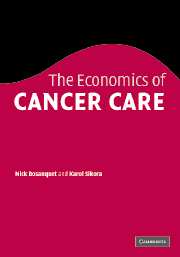Book contents
8 - Moving towards the new model: international comparison
Published online by Cambridge University Press: 07 September 2009
Summary
In this chapter we explore how different systems are moving towards the new model of cancer care. The USA has the best long-term data on changes in cancer care. The results there have been achieved in a pluralistic system. The UK presents an example of a highly centralised approach. Asia, on the other hand gives an example of a very limited response so far with an open field for future development.
USA
The services in the USA have been the pathfinders for world cancer services in terms of improving outcomes and changing models of care. The longterm data monitoring through Surveillance, Epidemiology and End-results (SEER) makes detailed analysis of outcomes and the effectiveness of care much more feasible than in most other health system. USA evidence has to be studied for its lessons for other systems. The USA has also seen the greatest commitment by government to the funding of research and improvement in cancer care through the National Cancer Institute (NCI). The principle economic developments, which can be identified in the USA, are both strategic and economic:
The focus of cancer strategy has shifted from concern with research for a “big bang” scientific breakthrough to application of the integrated model of cancer care from prevention through the extension of screening for early-stage cancer and palliative care for later-stage cancer. Inequities in access and treatment between white and African/Americans are also receiving much more attention.
[…]
- Type
- Chapter
- Information
- The Economics of Cancer Care , pp. 113 - 134Publisher: Cambridge University PressPrint publication year: 2006



